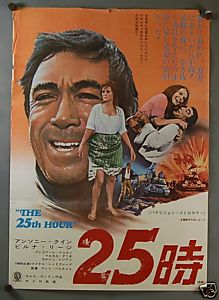
THE 25TH HOUR
France, 1967, 133 minutes, Colour.
Anthony Quinn, Virna Lisi, Gregoire Aslan, Michael Redgrave, Serge Regglani.
Directed by Henri Verneuil.
The 25th Hour is an international coproduction that did not meet approval of the critics but was very moving for popular audiences. Set in Eastern Europe and portraying a peasant family overcome by World War II, the film has much to say about war and the suffering that ensues. Anthony Quinn plays successfully the central role of the farmer who is incorporated into the army and chosen for the posters promoting Nazism. He is then considered a traitor. Separated from his wife and family for ten years he undergoes great suffering. He is the innocent victim. The film was directed by Frenchman Henri Verneuil who had made quite a number of thrillers such as the Burglars. Most audiences will find this film quite moving.
1. The meaning of the title as explained in the film? Its reference to Johann? To the war situation? To Hitler and the Nazis?
2. How sad a film was this? How gripping was it on the emotions of the audience? How graphic a picture of suffering? What insight into the nature of suffering did it give? How plausible was the film? It was based on fact. Did this come through? or did it seem too unreal? Were the main characters real so that we could understand this suffering?
3. How important was the fact that Johann was a peasant and that his suffering was tinged nevertheless with optimism? That he could keep going? Whereas Tralan, who had the knowledge, was pessimistic and killed himself?
4. Comment on the use of colour, the presentation of various countries, the use of music, especially the Roumanian folk themes. How effective were these in contributing to audience mood?
5. Was the technique of having dates and places in the film successful? As offering various chapters of suffering? As giving a cumulative effect of ten years? Did this make the decade of suffering plausible for audience acceptance? How?
6. How successful was the film in creating an atmosphere of happiness at the opening of the film? The Baptism, the young man wanting to go to America and freedom, the farm. the peasant life, the dancing etc.? How did the film show this tinged with menace with Dobresco on his horse?
7. How evil was Dobresco? Was his evil plausible? The menace of Susanna? Lust? The incomprehensible evil that he could send Johann to a camp? The irony of his success during the war? The irony of his execution by the partisans? Did he get what he deserved?
8. How sympathetic a character was Johann? As played by Anthony Quinn? As a peasant, A Roumanian, as a loving husband and father, his life in his village, the injustice of what he was to suffer?
9. How well portrayed was Susanna? In her village, as wife and mother, her happiness, her fending off of Dobresco? The injustice she was to suffer?
10. Study the phases of Johann's suffering. See the implications for him of suffering? His response to these, his lack of comprehension, his continued hopefulness, and the reality of the world in which he lived? His being sent to the Jewish camp, his identification with the Jews, his work on the canal, the effect on his life and the time taken, his musing at the canal site. The reality of the escape, being taken by the camp commander being taken by Jews, his not understanding what was going on, especially in view of the lack of hearing of his appeals. Budapest: the peasant in a city, his wanting to eat in the kitchen, the Jews’ inability to help a non-Jew. the irony of this, his joy in farewelling his friend at the station. The irony and stupidity of his being tortured as a spy, the sadness of his being condemned to a labour camp. The labour camp: two years had passed, his work in the camp, his cheerfulness of spirit in spite of injustice, his friendship with the Frenchman, his decision not to escape. How farcical and stupid was the section of the film on the racial characteristics of Johann, yet this really happened, the Germanic ideals of the super race, the incomprehension of the peasant, his being used on the magazines. Johann: as an SS guard, his humanity, his not understanding the German style, his decision to escape with the prisoners, the irony of his still being arrested by the Americans, the long months in the camp: the parallel between German imprisonment and American imprisonment, his being called to spell his name for the commander, the petitions, the discussion with Tryan and Tryan's death with his petition, the final incomprehension of the trial, Johann as victim? Susanna and her parallel experiences: her searching, her being fobbed off by minor officials, of the priest trying to find out the truth, his being rejected. the partisans and Susanna's having to leave this town because of Johann's pictures etc.
11. How effective was the court sequence? Was it long enough or was it just a symbol? Was there any justice in the prosecutor's statements? Was the appeal by the defence council to Susanna's letter too emotional? How effective for the audience and for the dram was Susanna's letter? The truth of her suffering?
12. How poignant was the reunion? Was it effectively done for this film? What was the e=tional content of this sequence?
13. How harsh was the ironic comment of the photographer at the station? His insistence on smiling? Their being photographed? And the emotions implicit in the profiles of this sequence? How effective an ending was this?
14. Was this a valuable humanitarian film? Of Johann as world suffering figure? As a hopeful figure despite suffering? The picture of an inhuman world?